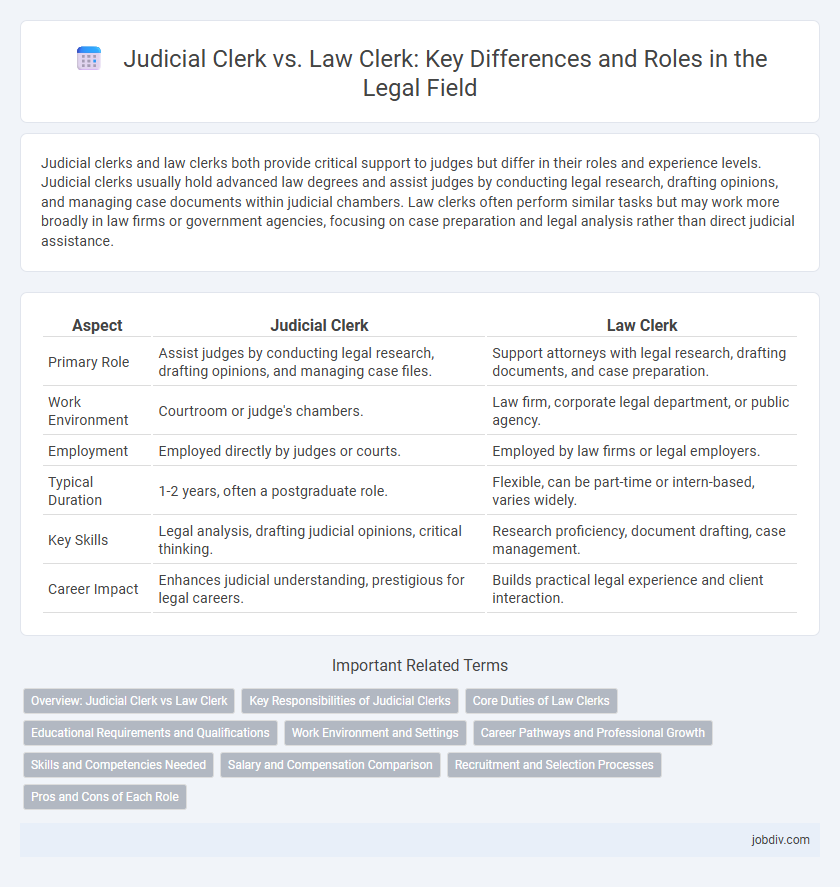Judicial clerks and law clerks both provide critical support to judges but differ in their roles and experience levels. Judicial clerks usually hold advanced law degrees and assist judges by conducting legal research, drafting opinions, and managing case documents within judicial chambers. Law clerks often perform similar tasks but may work more broadly in law firms or government agencies, focusing on case preparation and legal analysis rather than direct judicial assistance.
Table of Comparison
| Aspect | Judicial Clerk | Law Clerk |
|---|---|---|
| Primary Role | Assist judges by conducting legal research, drafting opinions, and managing case files. | Support attorneys with legal research, drafting documents, and case preparation. |
| Work Environment | Courtroom or judge's chambers. | Law firm, corporate legal department, or public agency. |
| Employment | Employed directly by judges or courts. | Employed by law firms or legal employers. |
| Typical Duration | 1-2 years, often a postgraduate role. | Flexible, can be part-time or intern-based, varies widely. |
| Key Skills | Legal analysis, drafting judicial opinions, critical thinking. | Research proficiency, document drafting, case management. |
| Career Impact | Enhances judicial understanding, prestigious for legal careers. | Builds practical legal experience and client interaction. |
Overview: Judicial Clerk vs Law Clerk
Judicial clerks primarily support judges by conducting legal research, drafting opinions, and managing case files within courts, often in federal or state judicial settings. Law clerks typically assist attorneys in law firms or government agencies by preparing case materials, researching statutes, and drafting legal documents to support litigation or transactional work. The key distinction lies in their employer and scope of responsibilities: judicial clerks work directly under judges, while law clerks support lawyers in various legal environments.
Key Responsibilities of Judicial Clerks
Judicial clerks primarily assist judges by conducting legal research, drafting opinions, and reviewing case files to ensure accurate and thorough case analysis. They play a crucial role in preparing orders and memoranda that influence court decisions and support the judge's workload. Their responsibilities also include summarizing testimonies and managing case documentation to maintain procedural efficiency in the courtroom.
Core Duties of Law Clerks
Law clerks primarily conduct detailed legal research, draft memoranda, and assist judges in preparing opinions, ensuring thorough analysis of case law and statutes. Their core duties include reviewing case files, summarizing legal arguments, and organizing trial materials to facilitate judicial decision-making. Law clerks also support courtroom procedures by managing documentation and aiding in the evaluation of evidence presented during trials.
Educational Requirements and Qualifications
Judicial clerks typically require a Juris Doctor (JD) degree from an accredited law school and often have prior legal experience or clerkship history to assist judges with case research and opinion drafting. Law clerks may be law students or recent graduates pursuing similar educational credentials but often serve in a more temporary, entry-level role to gain practical legal training. Both positions demand strong legal research skills, attention to detail, and a comprehensive understanding of legal principles and court procedures.
Work Environment and Settings
Judicial clerks primarily work within courtrooms and judges' chambers, supporting judges by researching case law and drafting legal opinions in a highly formal, judicial setting. Law clerks often operate in diverse environments such as law firms, corporate legal departments, or government agencies, performing legal research, document review, and case preparation in a less hierarchical atmosphere. Both roles require strong analytical skills but differ significantly in their workplace dynamics and direct interaction with judicial proceedings.
Career Pathways and Professional Growth
Judicial clerks typically work directly for judges, gaining firsthand experience in legal research, opinion drafting, and courtroom procedures, which often leads to enhanced opportunities in litigation, judicial appointments, or academia. Law clerks, employed by law firms or government agencies, focus on case preparation, client research, and assisting attorneys, providing foundational skills for advancement into associate or partnership roles. Both roles offer distinct pathways in legal careers, with judicial clerkships emphasizing exposure to appellate or trial court operations, while law clerk positions cultivate practical skills essential for private practice or public sector careers.
Skills and Competencies Needed
Judicial clerks require strong analytical skills, exceptional legal research abilities, and a deep understanding of court procedures to assist judges in case preparation and opinion drafting. Law clerks must demonstrate proficiency in legal writing, attention to detail, and the capacity to interpret complex statutes and precedents accurately. Both roles demand excellent communication skills, ethical judgment, and the ability to manage confidential information with discretion.
Salary and Compensation Comparison
Judicial clerks often receive higher salaries compared to law clerks due to their direct employment by courts and involvement in judicial decision-making processes. Law clerk compensation varies widely based on the employer, with private firms typically offering greater pay than government or public sector positions. Benefits and job stability tend to be more favorable for judicial clerks, reflecting the prestige and responsibilities associated with their roles.
Recruitment and Selection Processes
Judicial clerk recruitment prioritizes candidates with strong academic records, prior legal internship experience, and excellent legal research skills, often requiring a formal application through judicial chambers or court websites. Law clerk selection processes typically involve resume screening, interviews, and writing assessments conducted by law firms or legal departments to evaluate practical lawyering abilities and compatibility with firm culture. Both roles demand meticulous evaluation of analytical capabilities and legal knowledge, though judicial clerkships emphasize impartiality and courtroom procedure familiarity more heavily.
Pros and Cons of Each Role
Judicial clerks gain unparalleled experience in legal research and opinion drafting by directly supporting judges, enhancing courtroom insight but often face intense workloads and limited role diversity. Law clerks enjoy broader exposure to various legal practice areas, benefiting from mentorship in law firms or agencies, though their access to courtroom proceedings and direct judicial decision-making can be limited. Understanding these differences helps legal professionals align career goals with the practical advantages and challenges each role presents.
Judicial Clerk vs Law Clerk Infographic

 jobdiv.com
jobdiv.com